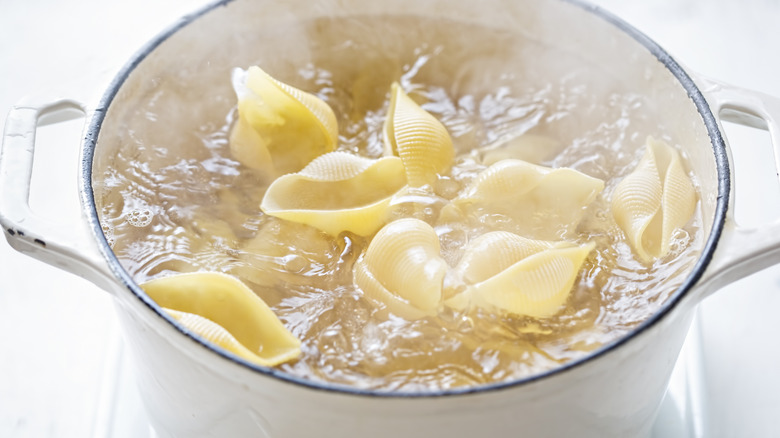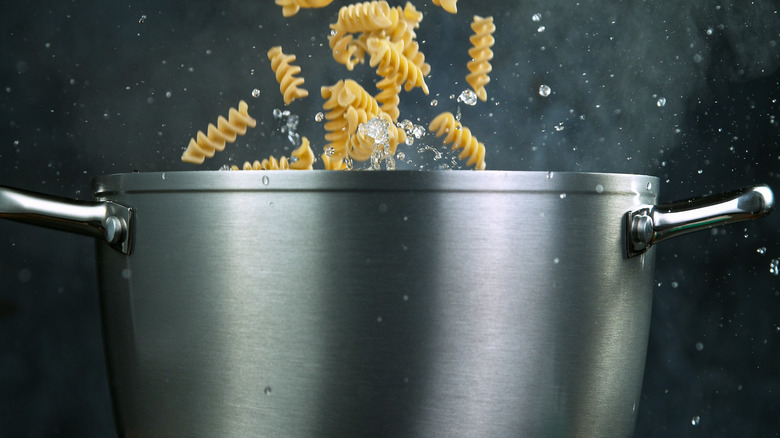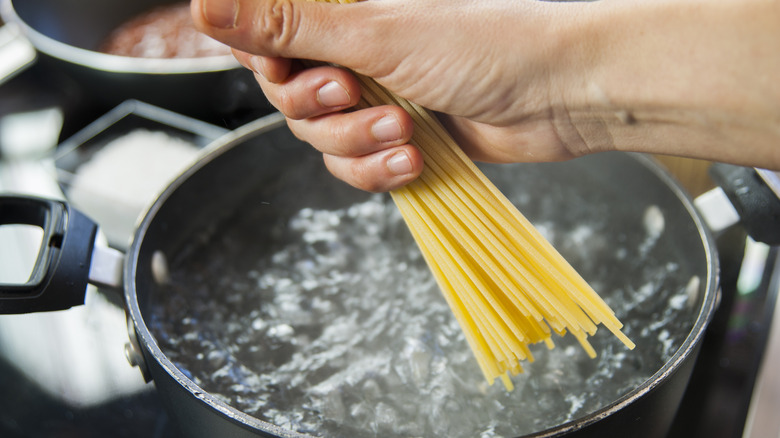Pasta Water Boiling Over? Switch To A Smaller Burner
While the phrase "a watched pot never boils" might not be a scientific commentary, many people nevertheless keep a keen eye on their pasta pots to ensure that water does not boil over. The unpleasant aroma of starchy water hitting the hot stove does not entice the appetite for a delightful meal. Although there are many old wives' tales about how to avoid the cooking blunder, the reality is that science impacts the hows and whys when this unfortunate error occurs.
After experimenting with various cooking methods, America's Test Kitchen discovered that the foolproof way to avoid pasta water boiling over is simply using a big pot on a small burner. While some people might assume that this process will be time consuming or even a potential energy waster, the reality is this concept is all about the science of cooking. By keeping the pasta moving in a constant circulation pattern, the roiling boil mimics constant stirring, which decreases the potential of water overflow. The bigger pot gives the pasta sufficient area to move and the smaller burner helps to regulate the temperature.
From professional kitchens to cooking competitions, a large pasta pot seems to be always ready and rarely boils over in these scenarios. For the next pasta night, put the big pasta pot on the smaller burner and leave your pan on the prime stove real estate.
Avoiding pasta cooking mistakes comes down to science
Cooking pasta might seem relatively simple, but a sprinkling of scientific knowledge can help any cook be more successful. Beyond salting the water, appreciating water's molecular properties can keep the liquid from overflowing in the pot. In addition to the big pot-small burner concept, combining two liquids can avoid an unpleasant spillage.
According to The Takeout, it might be time to go back to the classroom and remember the principle of surface tension when making pasta. For those people who may not remember elementary school science class, surface tension is why certain objects sit on the top of a liquid. In the case of boiling pasta water, the author suggests adding oil to the pasta water since oil is less dense than water. As the boiling bubbles rise, the oil has them repelling each other which can help to avoid a boil over.
Some people have thought that adding oil to pasta water prevents sticking, but The Takeout refutes that claim. It asserts that pasta needs to be stirred to avoid sticking. It seems that just plain boiling water might not be the most effective choice when making pasta. Maybe the real trick for perfectly al dente pasta is a big pot, a small burner, a pour of oil, and a substantial dash of salt. Sometimes it is the sum of parts that create the best final result.
Old wives' tales can be fun, but aren't especially useful
From the experienced chef to the novice cook, no one wants to have a mess in the kitchen. The sizzling sound and the burnt starch smell when pasta water hits the stove can leave an unpleasant cloud hanging over dinner. Although grandma might tell you to throw some salt over your shoulder for good luck, the debate between old wives' tales and science can have cooks questioning which school of thought to pay attention to. Given that using a large pot with a small burner is a strategy based in science, it leads cooks to wonder why anyone still puts a wooden spoon in a pot to avoid the boil over.
The wooden spoon method asserts that the escaping bubbles from the boiling water will hit the spoon, break, and no liquid will spill over the side. Unfortunately, a voracious boil can easily overtake a wooden spoon.
Given that home cooks want simple solutions to cooking dilemmas, many brands offer gadgets to avoid the boil over. Technology in the kitchen can be a guiding hand, but in the end, the real solution to avoiding potential pasta cooking mistakes is to be a diligent cook. A keen eye on the pot can prevent a pasta error before it occurs.


